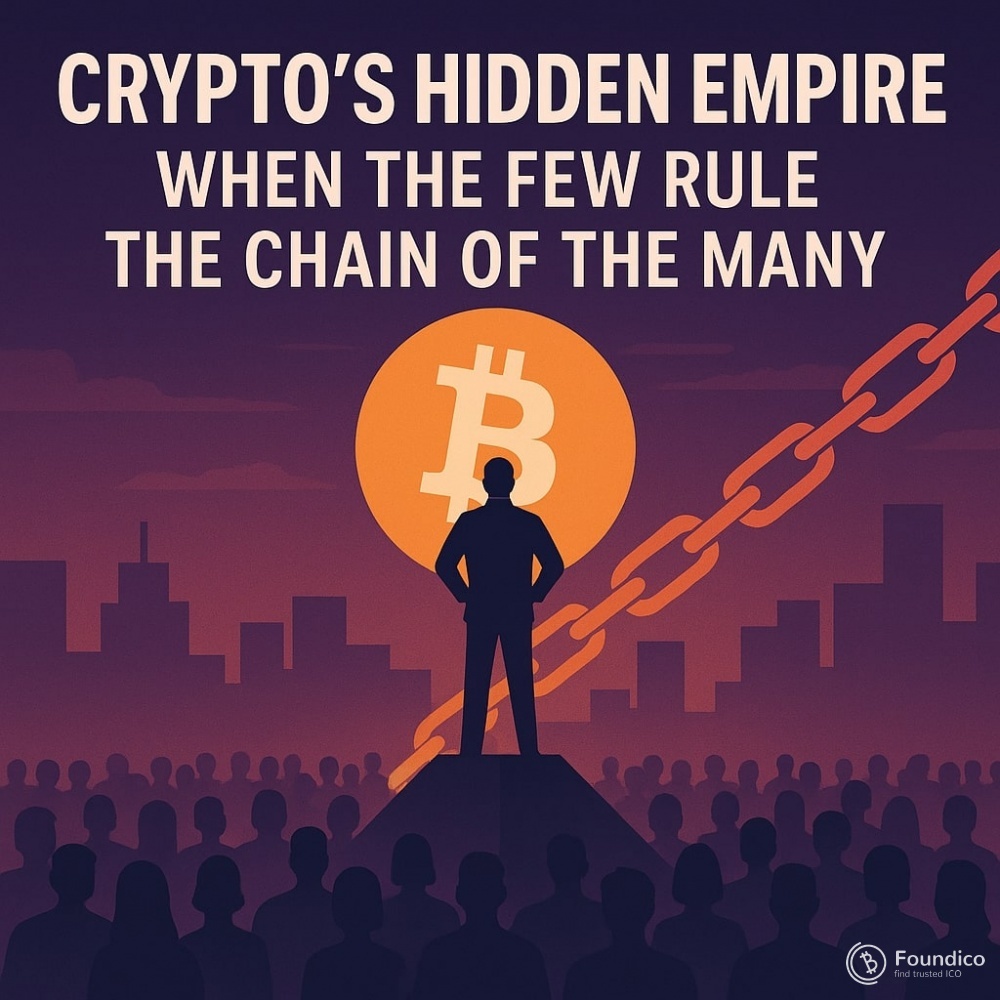Crypto’s Hidden Empire: When the Few Rule the Chain of the Many

By Dr. Pooyan Ghamari, Swiss Economist and Visionary
The promise of blockchain technology was bold and captivating: a world where power would be distributed, trust would be coded, and individuals would no longer depend on centralized authorities. Yet as the cryptocurrency ecosystem has matured, the uncomfortable truth has become harder to ignore—behind the narrative of decentralization lies a hidden empire, one in which a few powerful players quietly rule the chain of the many.
The Illusion of Equal Participation
From Bitcoin’s genesis block to Ethereum’s smart contracts, the story has always been one of empowerment. In theory, anyone with an internet connection can join the network, validate transactions, or contribute to consensus. In practice, however, economic and technical barriers have concentrated influence in the hands of a small elite. Expensive mining equipment, access to abundant capital, and insider knowledge of protocols have created gatekeepers in what was supposed to be an open system.
Mining Pools and Validator Oligarchies
Mining in Bitcoin is no longer a grassroots activity performed by hobbyists in basements. Instead, it has become dominated by industrial-scale operations and a handful of mining pools that collectively control the majority of the network’s hash power. This centralization poses systemic risks—if a few pools align, they could exert outsized influence over the chain.
Ethereum’s move to Proof-of-Stake was designed to address environmental and scalability concerns, but it too has introduced new forms of concentration. The wealthiest validators, often backed by large exchanges or institutions, now control vast amounts of staked ETH, giving them disproportionate power over network validation. What was meant to democratize participation has instead entrenched financial oligarchies.
The Exchange Kings
While blockchains themselves may claim decentralization, the reality of user interaction is largely mediated by centralized exchanges. Binance, Coinbase, and a few others control the lion’s share of global trading volume. They set the rules of engagement, determine which tokens thrive or die, and hold custody of billions in user funds. These platforms serve as the hidden emperors of crypto, dictating the terms while most users unknowingly comply.
Developer Elites and Protocol Power
Beyond miners and exchanges, protocol developers themselves form another layer of centralized power. The communities around Bitcoin and Ethereum often promote the idea of open-source collaboration, but in truth, a small group of core developers shape the networks’ future. Decisions about forks, upgrades, or changes to consensus mechanisms ultimately flow through these concentrated circles of influence, leaving the broader community with little more than symbolic input.
The Rise of Institutional Gatekeepers
Perhaps most telling is the growing dominance of institutional investors in crypto markets. Hedge funds, venture capital firms, and asset managers now wield immense influence over token launches, liquidity flows, and governance models. In many cases, the very same centralized financial powers that blockchain was meant to disrupt have simply repositioned themselves as rulers of the new digital empire.
Breaking the Hidden Empire
If blockchain is to truly fulfill its promise, the crypto world must confront this hidden empire. Solutions may lie in new governance frameworks, decentralized exchanges, community-driven validator pools, and more equitable models of distribution. True decentralization is not a finished product—it is a continuous process of resisting centralization and redistributing power.
The empire of the few may currently dominate the chain of the many, but history reminds us that empires are fragile. The strength of blockchain will depend not on the rhetoric of decentralization, but on the practical structures we build to ensure that no empire, hidden or otherwise, rules unchecked.

 Snorter - Snorter Bot ($SNORT) is a Telegram-native, meme-fueled trading terminal for Solana and beyond. Built for speed, stealth, and degen-level execution, Snorter lets you swap, snipe, and copy-trade straight from chat. Powered by the $SNORT token, it's the fastest way to hunt launches, dodge rugs, and flip your way to the top before anyone else even loads the chart.
Snorter - Snorter Bot ($SNORT) is a Telegram-native, meme-fueled trading terminal for Solana and beyond. Built for speed, stealth, and degen-level execution, Snorter lets you swap, snipe, and copy-trade straight from chat. Powered by the $SNORT token, it's the fastest way to hunt launches, dodge rugs, and flip your way to the top before anyone else even loads the chart.